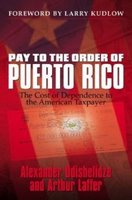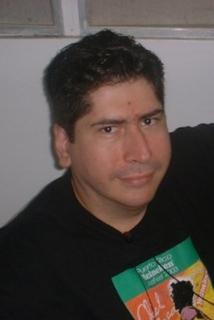Alex Odishelidze: Puerto Ricans need more say
 Alex Odishelidze: Puerto Ricans need more say
Alex Odishelidze: Puerto Ricans need more say01:00 AM EDT on Saturday, September 30, 2006
SAN JUAN
DEMOCRATS TODAY spend a lot of time criticizing the failure of conservative economics. Republicans, for their part, point to the lack of viable liberal proposals. For Puerto Rico, though, it's six of one, half dozen of the other.
That's the unavoidable conclusion of any honest analysis of Puerto Rico's sluggish economic performance. The picturesque islands have been betrayed by the good intentions of both the left and the right, and now Puerto Rico sees its economy strangled by high joblessness, low labor-force participation, overdependence on government entitlement programs, and selfish corporations seeking a tax haven.
It's the sort of dystopian outcome that results when too many good intentions are deployed by policy makers too far away, without sufficient insight or input from those supposedly benefiting from the policies, and it's played havoc with the Puerto Rican economy while costing American taxpayers billions. It's time that this situation ended.
The United States took Puerto Rico in 1898 as part of the terms of the settlement to the Spanish-American War. The island existed under military rule until World War I, when the desire for eligible soldiers helped spur Congress to extend citizenship to the residents of the territory so its young men could join the war effort. (They did not, however, extend political representation. Puerto Rico remains a territory and has merely a non-voting voice in Congress.)
The partial assimilation was an initial success; Puerto Rico lacked political clout, but its association with the U.S. clearly translated into economic benefits, and the island's economy accelerated throughout the post-World War II period. In 1950, its per-worker gross domestic product was 30 percent of America's; by 1980, it had reached 75 percent.
From that promising early trajectory, the latter 20th Century saw a slow economic implosion. Joblessness climbed, reaching 11 percent. Participation in the work force plummeted, with Puerto Rican men entering the labor market at 85 percent of the U.S. mainland's rate, and the women reaching only 62 percent. Per-worker income dropped from 40 percent of America's average in the 1970's to 30 percent.
The culprit here was American economic policy toward the islands. Taxpayers currently spend upwards of $22 billion a year financing an array of entitlement programs and benefits that have played havoc with the Puerto Rico's work incentives, while delivering little to the neediest. Though they may have been deployed with good intentions, the generosity of standard American disability benefits in a far poorer territory disincentivized work, and entitlement dependency became endemic. Transfer programs now make up over a quarter of the island's income, twice the amount that they do on the mainland.
If the entitlement strategy toward Puerto Rico was cracked, our investment incentives were beyond repair. A generous Congress offered massive tax breaks to multinationals that based themselves at offices in Puerto Rico and kept their profits on the island. The idea was that the companies would bring investment and job creation to the islands. Instead, Puerto Rico experienced a massive influx of misplaced investment that did little to strengthen the local economy. The corporations got the tax breaks, the government lost revenue, and the promised jobs failed to materialize. This has massively distorted the economic activity the island actually produces, rather than just plays host to.
Writing for the Brookings Institution recently, Barry P. Bosworth and Susan M. Collins found that working the data in a more relevant way cut Puerto Rico's economy by 20 percent since 1970 -- poor as Puerto Rico's growth has been, even much of that weak growth is illusory.
It's time for Puerto Rico to assume more responsibility for itself; leaving it up to mainland policy makers is clearly not working. Happily, there is growing interest in giving more say to the residents of Puerto Rico -- moving beyond their territorial status toward a more permanent democratic status reflecting the will of the Puerto Ricans.
In December 2000, President Clinton established a Presidential Task Force on Puerto Rico's Status and in December 2005, senior Bush administration officials issued a final report. The Task Force recommended an immediate plebiscite in Puerto Rico to decide among the continuation of Puerto Rico's status as a territory, statehood, or full independence. The Task Force then recommended the full cooperation of Congress with whatever path Puerto Ricans elect to follow.
After that, it's time for Puerto Ricans to sit down and undo their island's economic dysfunctions. Entitlement programs must be tied to work to combat the islands' inadequate labor-force participation and the tax code must incentivize investment and job creation, not corporate welfare and tax avoidance. But until Puerto Rico exits its current undemocratic status, which denies residents a vote in Congress or for president, true economic reforms are unlikely.
As of now, the good intentions of both the left and the right have failed. It's time that the Puerto Ricans themselves assumed the responsibility.
Alex Odishelidze is a businessman in San Juan and co-author of Pay to the Order of Puerto Rico: The Cost of Dependence to the American Taxpayer.



0 Comments:
Publicar un comentario
<< Home